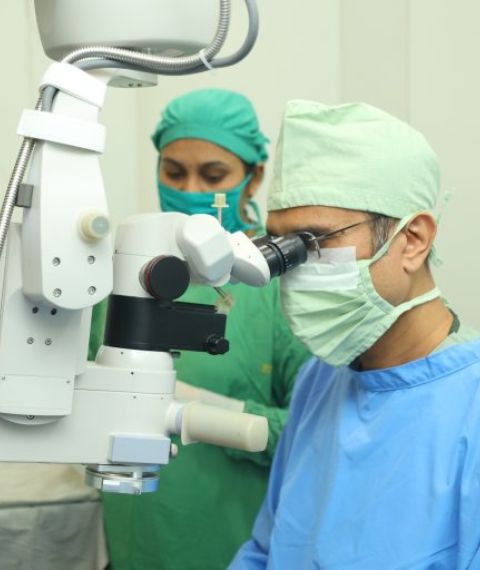MICS & Cataract

What is Cataract?
A cataract is the clouding of the eye’s natural lens, leading to blurred or hazy vision. It is not a growth or film over the eye. With cataract, colors may look dull, lights may glare, and vision gradually becomes poor, affecting daily activities like reading and driving.
Why Do Cataracts Develop?
- Aging (most common cause)
- Medical conditions (diabetes, kidney disease, glaucoma)
- Smoking, long-term medicines, injuries or infections
- Can also occur in infants due to genetics or trauma
Symptoms You May Notice
- Cloudy or blurred vision
- Faded colors
- Difficulty seeing at night
- Glare or halos around lights
- Needing brighter light for reading
- Double vision in one eye
Treatment Options
Cataracts cannot be corrected with glasses once advanced. Surgery is the only effective treatment.
At Saluja Eye Care Center, we offer:
- Phacoemulsification – ultrasound breaks cataract into small pieces, removed through a micro-incision
- Micro-Incision Cataract Surgery (MICS) – advanced, stitchless, safe, and quick recovery
- SICS – used for very hard cataracts
Lens Options After Surgery
We replace the cloudy lens with an intraocular lens (IOL). Options include:
- Monofocal – clear distance vision, glasses needed for near work
- Toric – corrects astigmatism
- Multifocal & Trifocal – clear near, intermediate, and distance vision, reduces need for glasses
- EDOF (Extended Depth of Focus) – better range of clear vision, especially for distance & intermediate
Get in Touch
👉 For consultations, call us at 7879301301 or email info@salujaeyecare.com.
Frequently Asked Questions
Clouding of your natural lens that causes blurred or hazy vision.
Usually no. It is typically done under local anesthesia with numbing drops. You may feel pressure but not pain.
About 15–20 minutes per eye in most routine cases.
Many notice clearer vision within 24–48 hours; vision continues to improve over the next few weeks.
Most day-to-day activities resume in a few days; complete healing often takes 2–6 weeks with drops as prescribed.
Infection, bleeding, inflammation, swelling, elevated eye pressure, or retinal detachment are uncommon but possible.
Avoid rubbing the eye, heavy lifting, swimming, and dusty environments until your doctor clears you. Use drops exactly as instructed.
Many patients still need glasses for some tasks. Your doctor will guide you on expectations for your case.
Yes, but good sugar control and retina evaluation are important to optimize outcomes.
See Life Clearly Again
Advanced Cataract Care with Premium Lens Options.
Book Cataract Evaluation
Book Cataract Evaluation Call Now